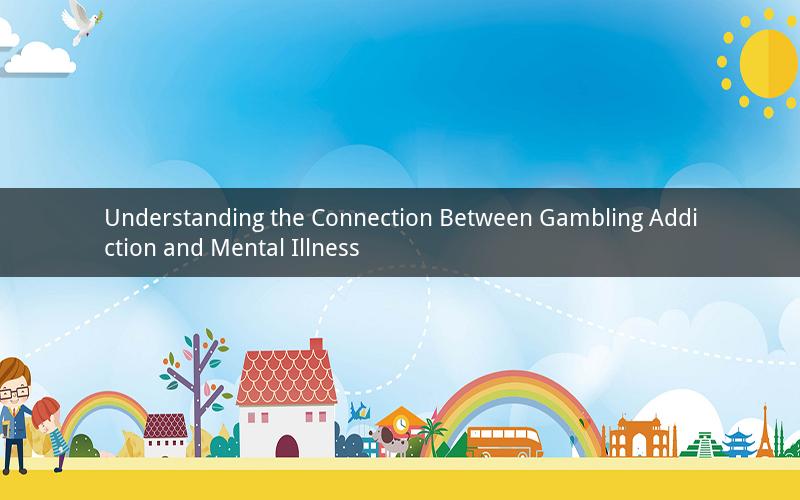
Gambling addiction, often referred to as gambling disorder, has long been a subject of debate in the medical and psychological communities. Many argue that it is a mental illness, while others believe it is a form of addiction that can be treated without necessarily categorizing it as a mental disorder. This article aims to explore the relationship between gambling addiction and mental illness, examining the evidence, theories, and implications of this connection.
1. What is Gambling Addiction?
Gambling addiction, or gambling disorder, is characterized by an inability to control or stop gambling despite negative consequences. Individuals with gambling addiction may experience intense cravings, preoccupation, and a sense of urgency to gamble. They may also lie to family and friends about their gambling activities, steal or sell personal possessions to fund their gambling habits, and neglect their responsibilities at work, school, or home.
2. Is Gambling Addiction a Mental Illness?
The debate over whether gambling addiction is a mental illness has been ongoing for years. While some experts argue that it is a form of addiction, others believe it should be classified as a mental illness. Here are some key points to consider:
a. Diagnostic Criteria: The American Psychiatric Association (APA) recognizes gambling addiction as a mental illness in the Diagnostic and Statistical Manual of Mental Disorders (DSM-5). The DSM-5 lists gambling addiction under the category of addictive disorders, which includes substance use disorders.
b. Neurological Evidence: Studies have shown that individuals with gambling addiction may have alterations in brain structure and function, similar to those seen in individuals with other mental illnesses. For example, a 2019 study published in the journal Brain found that individuals with gambling addiction had increased activity in the brain's reward system and decreased activity in the prefrontal cortex, which is involved in decision-making and impulse control.
c. Psychological Theories: Psychological theories suggest that gambling addiction may be rooted in underlying mental health issues, such as depression, anxiety, or personality disorders. These underlying issues may contribute to the development of gambling addiction, making it a mental illness.
3. The Impact of Gambling Addiction on Mental Health
Gambling addiction can have a profound impact on an individual's mental health. Some common mental health issues associated with gambling addiction include:
a. Depression: Many individuals with gambling addiction experience symptoms of depression, such as feelings of sadness, hopelessness, and loss of interest in activities they once enjoyed.
b. Anxiety: Anxiety disorders are also common in individuals with gambling addiction. These individuals may experience anxiety related to their gambling activities, as well as anxiety about the potential consequences of their addiction.
c. Substance Use Disorders: Individuals with gambling addiction may also have co-occurring substance use disorders, as they may use alcohol or drugs to cope with the stress and negative emotions associated with their gambling habits.
4. Treatment for Gambling Addiction and Mental Illness
Treatment for gambling addiction and mental illness often involves a combination of therapy, medication, and support groups. Here are some common treatment approaches:
a. Cognitive-Behavioral Therapy (CBT): CBT is a type of therapy that helps individuals identify and change negative thought patterns and behaviors associated with their addiction.
b. Medication: Some individuals with gambling addiction may benefit from medication, such as antidepressants or mood stabilizers, to address underlying mental health issues.
c. Support Groups: Support groups, such as Gamblers Anonymous, can provide individuals with a sense of community and support as they work to overcome their addiction.
5. The Importance of Early Intervention
Early intervention is crucial in treating gambling addiction and mental illness. Identifying and addressing the issue early can help minimize the negative consequences of the addiction and improve the individual's overall mental health.
FAQs:
1. Can gambling addiction be cured?
Answer: While there is no guaranteed cure for gambling addiction, treatment can help individuals manage their addiction and reduce its impact on their lives.
2. How common is gambling addiction?
Answer: The prevalence of gambling addiction varies by country and region, but studies estimate that it affects between 1% and 5% of the general population.
3. Can mental health issues cause gambling addiction?
Answer: Yes, mental health issues such as depression, anxiety, or personality disorders can contribute to the development of gambling addiction.
4. What are some signs of gambling addiction?
Answer: Signs of gambling addiction may include preoccupation with gambling, lying about gambling activities, stealing or selling personal possessions to fund gambling, and neglecting responsibilities.
5. How can I get help for gambling addiction?
Answer: Individuals seeking help for gambling addiction can consult with a mental health professional, join a support group, or seek treatment at a specialized gambling addiction clinic.